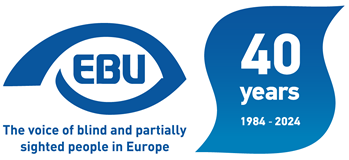The European Blind Union (EBU) Board held the first meeting of its present mandate on 16 January in Madrid, following its election during the General Assembly held in London in last October. The main objective was to examine the Strategic plan containing key initiatives defined by the Assembly and targeted to the 30 million blind and partially-sighted people living in the 44 European member countries.
Among those priorities, there are matters such as the ratification process of the Marrakesh Treaty, which presently only has 13 of the 20 national endorsements required, but which EBU hopes to complete during 2016; or the strategy to avoid undue delay in the implementation of the recently published European Accessibility Act. Concretely, Ms. Martín emphasised the need to go in depth and to forward to the European legislator the requirement of the accessible feature of websites and smart phones.
The Executive Director of the EBU Paris office, Mokrane Boussaïd agreed that we have to take advantage of the new legal instruments made available to 30 million blind and partially-sighted Europeans, to make our continent a leader in the field of universal accessibility, taking advantage of the recent publication of the European Accessibility Act.
EBU President Wolfgang Angermann from Germany was in favour of prioritizing some areas of greater urgency, which he considered of special importance for the immediate future, such as education, boosting Braille literacy making for access to information and training of blind people, or social benefits for blind people who need them most.
Getting acquainted with ONCE
Board members took advantage of the eve of the meeting, Friday 15 January, to visit ONCE Educational Resource Centre in Madrid and to get to know its inclusive educational model. Afterwards, during a visit to ONCE Foundation's FSC Inserta Headquarters they were also able to look into ONCE's co-management system of European social funds for training and employment of people with disabilities.

